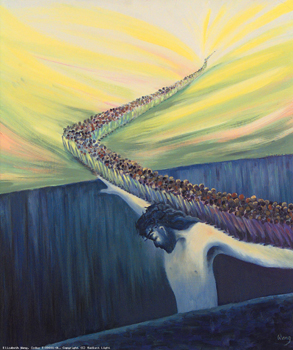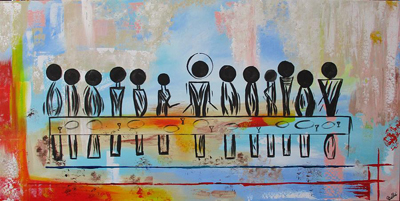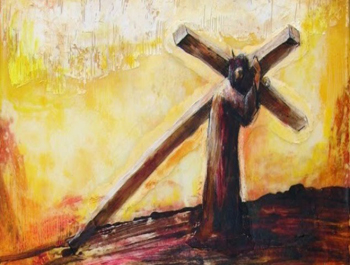For Sunday May 10, 2020
Lectionary Readings (Revised Common Lectionary, Year A)
Acts 7:55-60
Psalm 31:1-5, 15-16
1 Peter 2:2-10
John 14:1-14
On this fifth Sunday of Easter, the setting of our Gospel is grim and somber. Jesus has just finished a last supper with his disciples. He has washed their feet, given them a new commandment, predicted Peter’s denial, foretold Judas’s betrayal, and told his friends that he is about to leave them. “Where I am going,” he tells them, “you cannot follow now.”
Needless to say, the words sting, and fill the bewildered disciples with fear. What is Jesus talking about? How will they survive if he leaves them? Where will they go? What will happen to their cherished plans? Why is the ground shifting under their feet? Why is everything changing?
If you’re like me, sheltering at home, obsessively reading the daily headlines, and fearing what life is going to look like for the next many months or years, you can relate to the disciples’ questions. Why is the ground shifting under our feet? What’s going to happen to our families, our towns, our nations, our world? Will the center hold? Where is Jesus in all of this pain, fear, death, and loss, and how will we find him if he’s gone to a place we “cannot follow now”?
Unsurprisingly, the anxious disciples respond to their predicament by demanding certainty. Thomas asks Jesus for a roadmap: “How can we know the way?” Philip asks for proof: “Lord, show us the Father, and we will be satisfied.” What they want — what we all want, if we’re honest — is the religion of the GPS, the five point plan, the twelve steps, the ten commandments. “Do A, B, and C, and you will unerringly arrive at Destination D.”
Jesus’s response? “Do not let your hearts be troubled.” “I am the way, the truth, and the life.” “If you know me, you will know my Father also.” No roadmap. No master plan. No PowerPoint presentation. Just himself. Just the messy, intimate, ever evolving, and often confusing business of relationship. Of trust, patience, and vulnerability.
If you had asked me a few years ago to describe what the Christian life is supposed to look like, I would have rattled off a list of black-and-white “truths” as readily as a kindergartner recites the alphabet. I would have insisted that I had Christianity more or less down, and that whatever gaps remained in my knowledge would be filled in along the way — the point of the Christian life being to grow in stone cold certainty about God, Jesus, the Bible, and the faith.
 |
So reality has been — how shall I put it mildly? — a rude and massive shock. Who knew that my life with God would actually be one long goodbye? That to know God, I would have to unknow God? To shed my neat conceptions of the divine like so many old snakeskins, and emerge into the world bare, vulnerable, and new, again and again? Like the disciples suddenly facing the end of the Incarnation, I didn’t know that the process of shedding would be personal and costly. Or that it would hurt. Or that there would also be a complicated joy — layered and bittersweet — in the pain of parting.
“Let us pray to God that we may be free of God,” the 13th century mystic Meister Eckhart wrote, implying that our conceptions of God must always fall short, always fail. Let’s name honestly, he suggested, the imposter gods we conjure because we fear the Mystery who really is. Let’s admit that we shape these gods in our own image, and that they serve us as much as we serve them. Let’s dare to commit ourselves to the long goodbye.
Well, I’m trying, but I won’t lie: it’s hard. Some gods slough off easily. But others cling. Like the disciples in this week’s lectionary, I find it very hard to let go of one way of relating to Jesus, and trusting him into another. Here are some of the “imposter” gods I’m struggling to prise off now, in the shadow of Covid-19:
The god who bargains, transacts, and seals the deal: if I do A, then god does B. If I behave, then I’ll be loved. If I mess up, I’ll make god angry. If I work hard, I’ll earn forgiveness. If I’m the best, I’ll earn a blessing.
The god whose omnipotence guarantees my safety: the god who spares the children, eliminates the virus, stops the rapist, and defuses the bomb. Who conquers depression, ends anxiety, eliminates terror, and postpones death. The god who explains satisfactorily when things go wrong.
The god whose perfect will controls everything: the god who secures parking spots, bank balances, good health, and gentle partings. Who controls my choices and directs world history. The god whose desires order all things, such that nothing happens unless this god wants it to.
 |
The god who makes faith easy, by providing answers, erasing doubts, planting signs, and peddling miracles. By coming when called, and leaving when dismissed. By parting all clouds, and enabling me always and everywhere to feel his presence.
These are just a few of my current imposters. I’ve had others, and I will again, I’m sure. Layer by layer, I work to peel them back. The difficulty is, these gods don’t look ugly or sinister. They look beautiful. They speak kindly and make the most alluring promises. They pretend to make the world less scary, more manageable, more tame. They play tricks on my tired mind. Worse, they take hold of my deepest hungers and promise feasts beyond imagining. I’m afraid I’ll starve if I let them go.
So I pray and wait, wait and pray. I ask for the courage to say goodbye again and again and again, and I mourn the deaths of these gods, even as I recognize them to be fake. I pray to God to be free of god — of all the gods who keep me from apprehending the One who really is. And then I pray to know the God who dwells in mystery. The God who says, “I have to go now, but I will still be with you. Things are changing, but you are not alone.” I pray to love this God. To trust this God. To thrive under this God’s care. I pray for what will come after each long and arduous goodbye. I pray to know the God who IS.
Maybe it feels like a tall order right now, to “not let your heart be troubled.” To trust that you do in fact know the way — the quiet, unglamorous, risky, but ultimately life-giving way of Jesus. But you do. Like Thomas, like Philip, like Peter, like the others, you know Jesus. You know his life. You know his love. You know his death. You know his resurrection. You know what it is to hunger for him, to seek him, to listen for him, to hope in him. You know the way.
No, the way isn’t what we thought it was going to be. The way is demanding. The way is precarious. The way takes time. But the invitation of this Gospel is still an invitation to confidence. Not because we're experts at finding God, but because God has always and already found us. With every unknowing we embrace, God finds us one more time.
 |
“In my Father’s house there are many dwelling places,” Jesus tells his sorrowing disciples. Meaning: God is roomy. God is generous. God is hospitable. God can handle your doubts, your fears, and your questions. And God’s offer of belonging extends far beyond the confines of this mortal life. “I go and prepare a place for you,” Jesus says as he stands in the shadow of his own cross. You have a place with me. You have a place with God. You have a place.
A grim setting. Real questions. An offer of comfort. The promise of home. The Way.
This is a Gospel for our time. The story — your story, my story, our collective story of this precarious, overwhelming moment — will not end in death. Though we might feel alone and frightened right now, the Way is open before us. We know it. We know Jesus, and because we know Jesus, we know God. The Way will safely bear us home. Do not let your hearts be troubled.
Debie Thomas: debie.thomas1@gmail.com
Image credits: (1) Christian Art Today; (2) Fine Art America; and (3) Let's Talk About Sunday.





